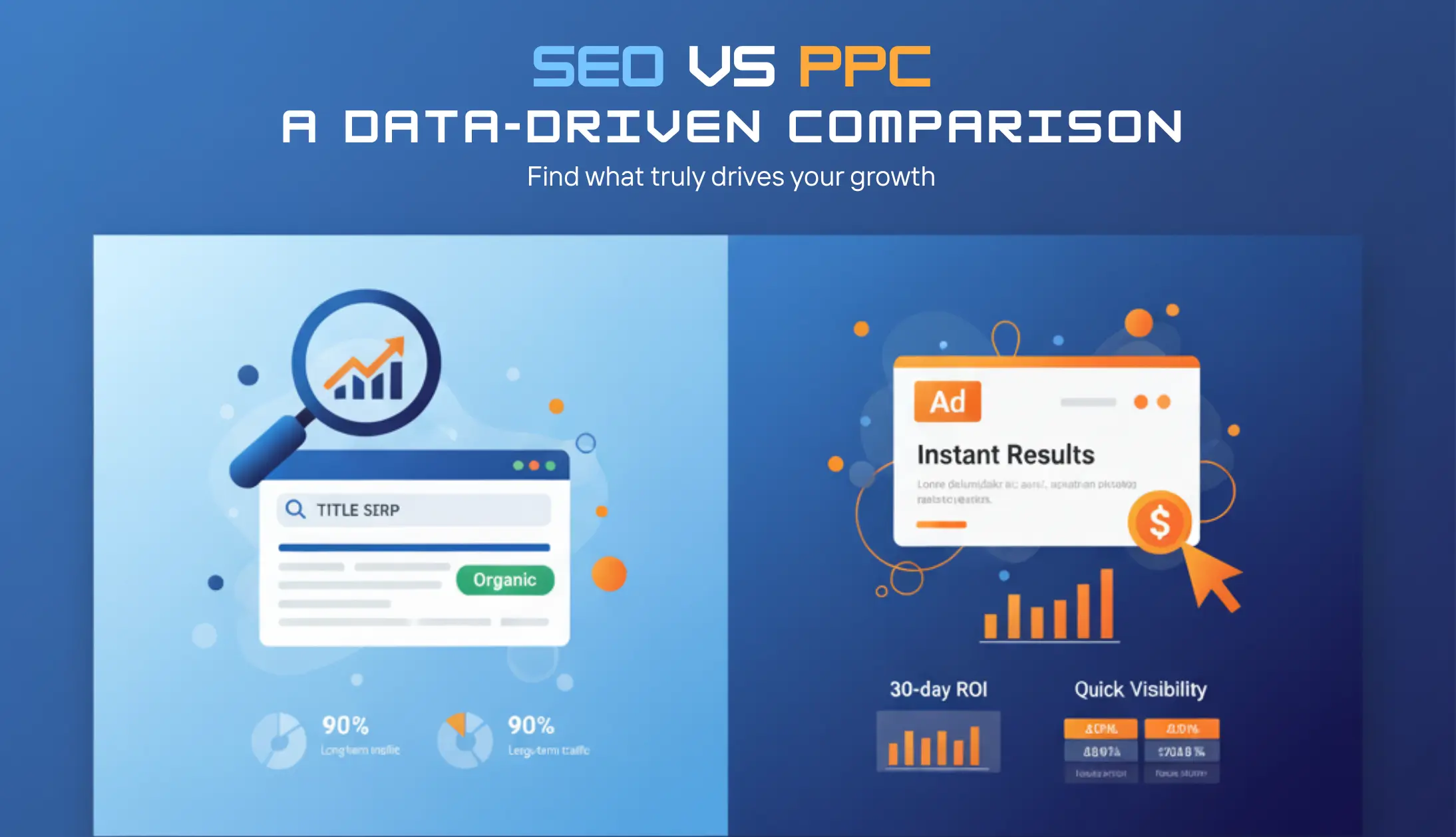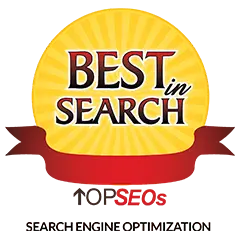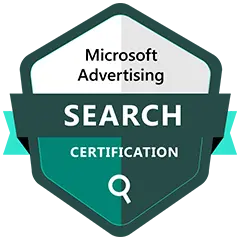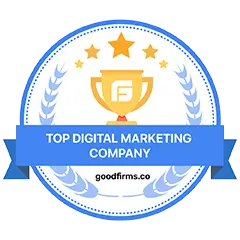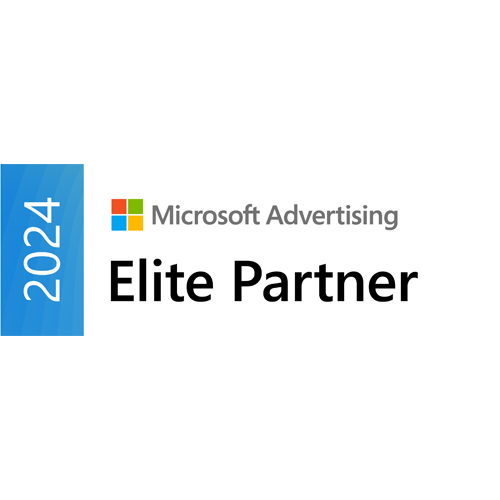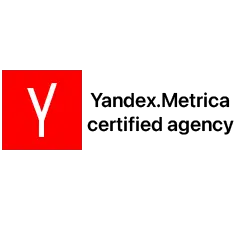SEO or PPC? Finding the best choice for your digital marketing strategy has become confusing nowadays. Businesses have to spend a significant amount of time deciding whether SEO is the best option or a paid marketing campaign. They struggle to find an answer to the question “Is traffic more important than leads?”. There are many other questions about SEO and PPC that most businesses are currently struggling with.
The questions come up in nearly every marketing strategy meeting in an office. Well, both strategies work, but their success depends on your business goals, budget, and timeline. Analyzing data about both marketing strategies will help you make an informed decision. We have made the analysis easy for you in this blog.
Our marketing experts will walk through the key differences, real data, expert opinions, and practical tips to help you decide which path is best for your business. Let’s begin with simple definitions of SEO and PPC.
What Is SEO?
SEO stands for Search Engine Optimization. It’s not a one-time task or activity; it’s a continuous process of improving your website’s visibility in organic (unpaid) search engine results. It means that the better your SEO, the higher your pages rank when users search for relevant keywords. Even after the surge of generative AI, around 75% of companies continue to use this digital marketing method extensively.
Key components of SEO include:
- On-page SEO: Optimizing content, titles, URLs, and internal links
- Off-page SEO: Building high-quality backlinks and online authority
- Technical SEO: Ensuring your website is fast, secure, and mobile-friendly
What Is PPC?
PPC stands for Pay-Per-Click. It is a form of online advertising where you pay every time someone clicks on your ad. Unlike SEO, PPC brings instant visibility by placing your ad at the top of search results or on social media platforms. Previously, it was used to display ads on Google pages; nowadays, it is also widely used for showing ads on social networks.
Popular PPC platforms:
- Google Ads
- Bing Ads
- Meta Ads (Facebook/Instagram)
- LinkedIn Ads
- YouTube Ads
5 Major Differences Between SEO and PPC
Understanding the difference between organic marketing (SEO) and paid marketing (PPC) will help you choose the right method to achieve your business goals. We have discussed 5 major differences. Have a look.
1. Which Is a Costly Method, SEO or PPC?
Cost is a crucial factor that you can’t ignore when considering one method. If a digital marketing strategy exceeds your set budget, it can be a red flag for your other business processes, as you will then need to adjust your expenses accordingly.
- SEO: You must have sufficient time to implement SEO strategies and wait for the results to take effect. Generally, SEO is less expensive than PPC; however, you must still invest in tools, content creation, and optimization. There is no cost per click, but your team and tools require payment for their work.
- PPC: This is a more expensive method compared to SEO, as you have to pay per click. This is why big industry leaders use PPC, mostly because they can afford to pay for each click. Although it’s a costly method, most of the time, you don’t have to wait for results for long because PPC provides them quickly. According to WordStream, the average cost per click (CPC) for Google Ads is $2.69, but it varies by industry.
2. Which One Takes Longer to Show Results?
Before selecting a method, analyze whether you want immediate results or have enough time to wait for them. It is because both methods work at their own pace.
- SEO: You may need to wait 3-6 months to see measurable results, as SEO is a process that takes time to show results. The process includes the following steps:
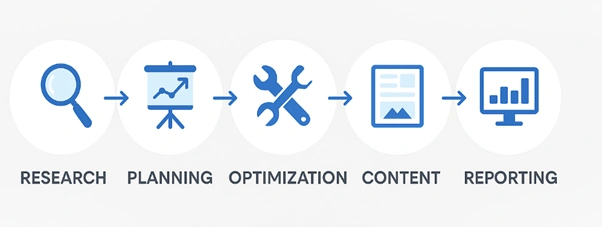
Moreover, you need to be aware of SEO trends in 2025 and stay current to implement new strategies proactively. It reduces wait time for results.
- PPC: It shows results almost immediately once the ads go live. You don’t have to wait long to see results if you have applied ads correctly. However, ensure you select the right campaign type, goal, budget, and bid for the relevant keywords.
Neil Patel says, “If you need leads today, go with PPC. If you want to build a sustainable engine, go with SEO.”
3. Which Has a Higher Click-Through Rate?
Considering the Click Through Rate is equally important as other factors, because it immensely affects the result of a digital marketing campaign. The higher the CTR, the higher the chances of attracting more traffic.
- SEO: Here, SEO is a winner because its results often have a higher CTR than ads. When your website appears in the first position in SERPs, it has a higher chance of receiving more traffic because people tend to click on the site shown at the top. 75% of people never go past the first page of search results. Similarly, if your social media account appears at the top of search results on social media apps, it has a higher chance of receiving more clicks.
- PPC: On the other hand, PPC has a lower CTR compared to SEO. People do not like to see ads and click on them. They view them as someone trying to sell something, unless they need the product immediately or the price is too low. A study by Smart Insights found that organic search gets 53% of all website traffic, while paid search only gets around 15%.
4. Which Delivers Higher Conversion Rates?
The goal is conversion; if it’s high, it means you are using the right method to some extent. However, several factors influence the conversion rate, including industry, business type, and others. For example, in the automotive industry, the SEO conversion rate is 2.5%, but the Ad marketing conversion rate is 1.3%. Let’s analyze both methods based on their conversion rates.
- PPC: For many businesses, PPC generally delivers a higher conversion rate. It is because ads are shown to users with strong buying intent. With proper targeting and compelling copy, PPC can drive quick actions. However, the cost per conversion may be high, depending on the industry and level of competition.
- SEO: SEO conversions may be lower at first, but often grow stronger over time. As you build authority and attract organic traffic, SEO brings in users who trust your brand. While SEO may take time to convert, it typically provides better ROI in the long run.
A list of some industries and conversion rates of SEO and PPC marketing for them.
| Industry | Ave. SEO Conversion Rate | Ave. PPC Conversion Rate |
| 1. Biotech | 1.8% | .7% |
| 2. B2B SaaS | 2.1% | 1.0% |
| 3. Construction | 1.9% | 1.9% |
| 4. eCommerce | 1.6% | 1.3% |
| 5. Financial Services | 2.2% | .3% |
| 6. Oil and Gas | 1.7% | 1.5% |
| 7. Real Estate | 2.8 | .8% |
Source for the table data: https://firstpagesage.com/reports/seo-vs-ppc-statistics-conversion-rates-compared-fc/
5. Which Method’s Results Last Long?
When choosing between SEO and PPC, it’s not just about quick wins; it’s also about how long the results stick around. Some strategies give you instant traffic but fade fast, while others take time yet keep delivering. Let’s compare SEO and PPC to see which one gives you longer-lasting value.
- SEO: It offers long-lasting results. Once your pages rank well on Google, they can continue bringing in traffic for months or even years. It builds long-term visibility and brand trust. You only need to track your website’s rank to keep it on the first page.
- PPC: Its results are short-term. The moment you stop paying, your ads disappear, and traffic drops. It’s effective for immediate impact but not ideal for long-term visibility. So, if you are looking for stability and continued growth and have a tight budget, it might not be the right investment.
| Feature | SEO | PPC |
| 1. Cost | Low cost | High cost |
| 2. Time to see results | Longer | Immediate |
| 3. Click-through rate | Around 70% organic clicks | 15-30 clicks through ads |
| 4. Long-term value | High | Low |
| 5. Trust level | Higher | Lower |
Pros and Cons of SEO
Here are some downsides and upsides of using SEO. Knowing them helps you avoid fake claims by agencies.
Pros:
- Long-term traffic growth
- Builds brand credibility
- No cost per click
- Higher CTR for high-ranking pages
Cons:
- Takes time to build authority
- Algorithms can change (Google updates)
- Requires ongoing optimization and content
Following the advent of ChatGPT and other generative AI tools, Google updated its framework to assess the quality of content and included AI overviews and AI mode. It has made ranking pages on Google SERPs difficult.
The three main disruptions in SEO performance nowadays:
- Google EEAT
- Generative AI
- Zero-click Searches
Pros and Cons of PPC
Also, check the upsides and downsides of PPC so you can be clear about its role in your business and strategies.
Pros:
- Instant visibility
- Great for targeting specific audiences
- Easy to measure and track ROI
- Ideal for product launches or seasonal promotions
Cons:
- Can be expensive
- Traffic stops when the budget ends
- Ad fatigue over time
- May get ignored by users who skip ads
Which Method to Choose When?
To find the answer to the above question, you need to analyse some situations. Explore them below.
Go for SEO if:
- You are planning for the long term.
- Your product or service has consistent demand.
- You want to build a brand presence online.
- You are willing to invest in content marketing and optimization.
So, SEO can be perfect for you if you run a local business. With local SEO strategies, you can thrive effectively. SEO is an effective method for bloggers and content creators. Moreover, consultants and coaches can also go with this strategy. Many educational and news websites also use SEO immensely.
Go for PPC if:
- You need leads or sales quickly
- You are promoting a limited-time offer or launch
- Your niche is highly competitive, and SEO would take too long
- You have a solid budget and want predictable results
So, PPC can be perfect for eCommerce websites because they need to sell new stock before it becomes outdated. Similarly, event companies require quick conversion, and ads help with it. Real estate and legal industries also find SEO effective. Moreover, most startups use SEO for new products and to capture the market.
Can You Combine SEO and PPC?
While reading the blog, you might also think of it. You do not need to stick to one method. You can use a combination of both for better results. Many businesses do it. They combine strategies to maximize their effectiveness. SEO helps build long-term visibility and trust, while PPC gives you quick wins and targeted reach. You can use PPC data to strengthen your SEO strategy, and vice versa. Together, they can boost your brand’s presence across the entire search results page.
Final Thought
SEO and PPC marketing strategies have their pros and cons. Their results may vary at different points of the stage, but they help to grow your business. Understanding them thoroughly will help you choose the best one for your business. Find the best platforms and tools that help you implement the strategy. However, you can’t completely rely on tools, as your analysis of your business needs also plays a significant role in selecting a method. So, after understanding the difference between SEO and PPC and their upsides and downsides, thoroughly analyze what exactly your goals are. This way, you can pick the best one quickly. You can also use a combination of both strategies if you think you need consistent and quick results.
